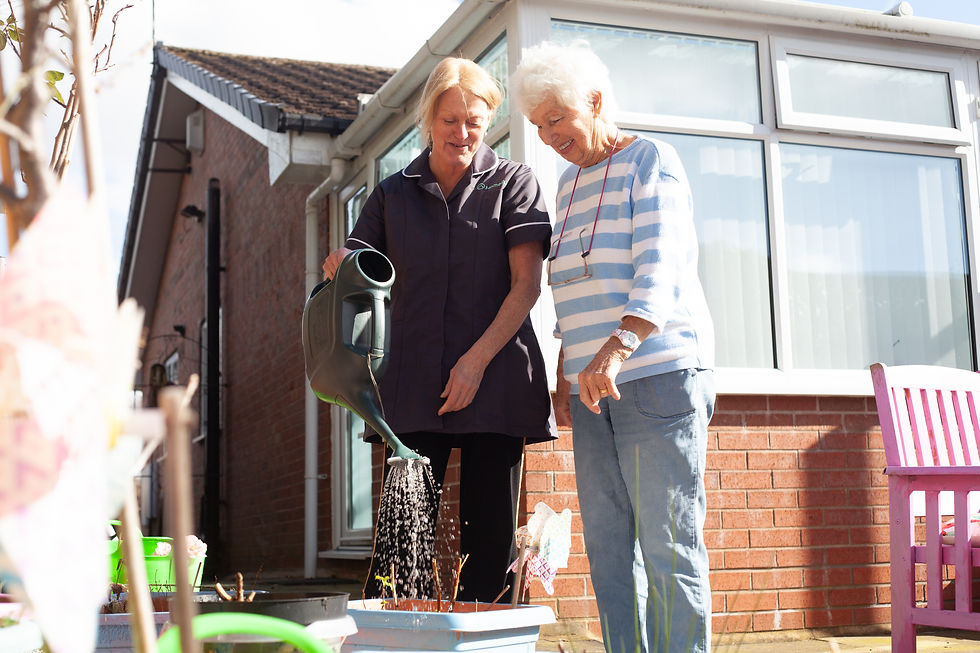How Hydration Helps Prevent Falls in Older Adults
- Homelium

- Apr 29, 2025
- 2 min read
Updated: Jun 17, 2025

Falls are one of the leading causes of injury and hospitalisation in older adults. While we often focus on physical strength, footwear, or home safety when it comes to fall prevention, one often-overlooked factor plays a big role: hydration.
As we age, our body’s ability to conserve water decreases, and the sensation of thirst becomes weaker. This makes older adults more prone to dehydration, and with it comes a range of side effects that significantly increase the risk of falling. Here’s how staying well-hydrated can help protect older individuals from dangerous slips and stumbles.
1. Prevents Dizziness and Lightheadedness
One of the earliest signs of dehydration is dizziness or lightheadedness, especially when standing up quickly (a condition known as orthostatic hypotension).
Staying hydrated helps:
Maintain stable blood pressure
Improve circulation
Reduce sudden dizzy spells that can cause unexpected falls
2. Supports Muscle Function and Joint Health
Dehydrated muscles fatigue more easily, and joints become stiffer when the body lacks adequate fluids.
Good hydration can:
Improve muscle control and coordination
Help reduce cramps or muscle weakness
Keep joints lubricated for smoother movement
This means older adults are better able to walk, balance, and recover quickly from stumbles.
3. Enhances Mental Clarity and Focus
Even mild dehydration can affect brain function, leading to confusion, delayed reaction times, and poor decision-making.
Hydration supports:
Clearer thinking and alertness
Faster reflexes
Better awareness of surroundings
All of these reduce the chance of tripping or misjudging steps and surfaces.
4. Promotes Healthy Blood Pressure
Low fluid intake can lower blood volume, leading to a drop in blood pressure, especially upon standing.
Staying hydrated:
Stabilises blood pressure levels
Prevents sudden “head rushes”
Reduces the risk of fainting or feeling unsteady
5. Prevents Urinary Tract Infections and Incontinence-Related Falls
Some older adults reduce fluid intake intentionally to avoid frequent urination, but this can backfire.
Adequate hydration:
Prevents urinary tract infections (which can cause weakness and confusion)
Helps regulate bladder function
Reduces night time urgency, lowering the risk of night time falls
6. Encourages Healthy Habits and Routines
Having a hydration routine such as drinking water with each meal or keeping a water bottle within reach helps maintain overall wellness.
Simple hydration habits can:
Build structure into the day
Encourage movement (e.g., walking to get water)
Prompt caregivers to check in regularly
These little routines support safety, mobility, and emotional wellbeing.
Tips for Encouraging Hydration in Older Adults
💧 Offer water regularly, not just when they feel thirsty
🫖 Include herbal teas, broths, or milk for variety
🍓 Add hydrating foods like watermelon, cucumbers, and oranges
🧊 Try flavored water or water with fruit slices for taste
🕒 Use reminders or timers for regular sips throughout the day
Staying hydrated may seem like a small part of daily care, but it has a powerful effect on preventing falls in older adults. By supporting physical strength, balance, and mental clarity, hydration plays a quiet but crucial role in fall prevention. Whether you’re a caregiver, family member, or health professional, encouraging regular fluid intake is a simple, effective way to keep older loved ones safe, steady, and strong.
Call us today to book your free fall prevention risk assessment on 0333 3448 677 or email hello@homelium.com!




Comments